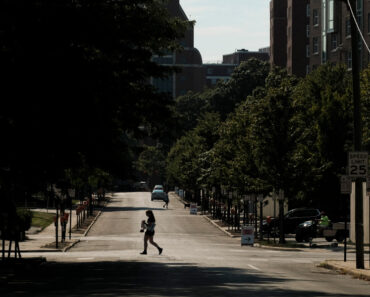This post was originally published on this site
Bernard Nourrice was 5 years old when the boat came. Like the others, his family was told on short notice that they were to leave behind their lives on the island of Diego Garcia, in the middle of the Indian Ocean. Each family was allowed to quickly pack one suitcase and one mattress. “The British navy led us to the jetty. When we boarded the boat, they waited for when it got dark,” he recalls. Sharing the boat with a pig, a donkey, and a chicken, they set sail for the Seychelles, more than a thousand miles to the west.
The year was 1973, and the boat’s occupants were the last of around 1,800 people to be removed from the Chagos Islands under a five-year forced-deportation campaign perpetrated by the United Kingdom, which has claimed ownership of the islands for two centuries—and which refuses to give it up, despite a demand from the United Nations to decolonize the territory.
Located about halfway between East Africa and Indonesia, the tropical archipelago is strategically useful. The British had already started leasing Diego Garcia—at 10 square miles, the largest of the 1,000-plus islands—to the United States military in the mid-1960s. Now, to satisfy the terms of the deal, the U.K. was clearing the Chagos Islands of inhabitants, dismissed at the time by British diplomat Denis Greenhill as a “few Tarzans or Man Fridays.”
Nearly half a century later, the Chagossians—with health care workers Nourrice and Solomon Prosper acting as their representatives—are trying to reclaim their home, along with what is arguably its most lucrative resource: the “.io” web-address extension, widely used by technology startups owing to its “input/output” connotations.
The country code top-level domain (ccTLD) actually stands for “Indian Ocean,” and it specifically refers to the British Indian Ocean Territory, or BIOT. That’s the Chagos Archipelago.

In July, the Chagossians submitted a claim to the African Commission on Human and Peoples’ Rights, asking for a declaration to say they are the rightful owners of .io—a $50 million digital property they say is plagued by the criminality of cryptocurrency scam artists and money launderers.
“The Chagossians receive no income from any of these colonial activities nor have any meaningful input in their management,” the claim reads. “The [U.K.] and its BIOT administration has not only stolen the entire Chagos Archipelago and everything on, under, and above it but also engages in virtual and digital exploitation and even tolerates massive criminality in order to generate revenue.”
Some tech consultants and legal experts suggest that, if the U.K. were to give up ownership of .io, the extension could end up being retired. This would be a huge blow to the many thousands of companies that use it, which include the likes of seat-reservation outfit Seats.io and the Plan.io project-management tool. (Even U.S. Sen. Marco Rubio used a .io address, rub.io, during his 2016 presidential bid.)
But if they get their wish, the Chagossians hope it will be the first step on the road to reclaiming what they see as their asset. A couple of weeks ago, Nourrice and Prosper also sued the U.S. military for damages of up to $100,000 per islander, which their lawyer described as “only a small fraction of the back rent” for the Americans’ Diego Garcia facility, a crucial bomber base (and rendition vector) in the War on Terror.
“The original owners of the land need something for it,” says Prosper, who is currently unemployed due to a work-related injury. “It’s our property.”
Disputed territory
The Chagos Islands were originally settled by the French in the 18th century as a site for coconut plantations. The U.K. took control in 1814, following the defeat of Napoleon, and ended up tacking the islands onto another British colony, Mauritius, which lies over 1,300 miles to their southwest.
The Chagossian people are largely descended from the African slaves who were brought across in the early 19th century from Mozambique and Madagascar, to work the plantations.
By the mid-20th century, the British Empire was crumbling, and its African colonies were preparing for independence. But a few years before Mauritius gained its sovereignty in 1968, the British—who were already secretly in talks with the U.S. military—bought the Chagos Islands from Mauritius for 3 million pounds (around $72 billion in today’s money). The islands became BIOT, and their inhabitants were dumped, impoverished, on Mauritius and the Seychelles.
Some, such as Nourrice, were taken directly to the Seychelles. Prosper, at the time an infant, was one of those who were first taken from Diego Garcia to the Chagos Islands’ smaller Peros Banhos atoll, in 1971.
“They left us for two years,” Prosper says. “Only one boat came in the middle of 1972, which brought a lot of sickness, diarrhea, vomiting. Two people died…We survived two years without any external help. In August 1973, they deported everyone from the Chagos to the Seychelles.”
However, by the end of the 1970s the Mauritian government was arguing that it had “had no choice” about the slicing-off of the Chagos Islands, and it began campaigning for ownership of the archipelago. A long-running legal dispute began, culminating in a nonbinding opinion from the International Court of Justice (ICJ), produced in February 2019 at the request of the United Nations General Assembly.
“The United Kingdom is under an obligation to bring to an end its administration of the Chagos Archipelago as rapidly as possible,” the ICJ found, near-unanimously. In May 2019, based on the ICJ’s opinion, the UN General Assembly demanded that the U.K. “unconditionally withdraw its colonial administration from the area within six months.”
“Because the detachment of the Chagos Archipelago was not based on the free and genuine expression of the will of the people of Mauritius, the decolonization of Mauritius has not been lawfully completed,” the General Assembly’s resolution read.
During the ICJ hearings, the U.K. said it “fully accepts that the manner in which the Chagossians were removed from the Chagos Archipelago, and the way they were treated thereafter, was shameful and wrong, and it deeply regrets that fact.”
But it refused to give up the islands. Now nine months past the UN deadline, the U.K. government insists it will only cede BIOT to Mauritius when it is no longer required for “defense purposes.”
But what about .io?
Virtual asset
The .io ccTLD was created in 1997. Country code top-level domains are generally supposed to be used by companies or residents of the relevant country—.de for Germany, .cn for China, and so on—but only American military personnel and British government officials live on BIOT, and only temporarily at that.
So .io has become one of the most popular extensions for the online presences of tech startups and cryptocurrency operations. More than 270,000 .io websites have been registered. According to the Chagossians’ claim, .io domain registrations bring in fees of $10 million each year, and the ccTLD has an overall value of around $50 million.
The British government does not handle the registration of .io domains itself. Instead, it contracted this task to a company called Internet Computer Bureau (ICB), which was until a few years ago run by a British entrepreneur named Paul Kane.
The terms of the agreement remain secret, but in 2014 Kane told me that a portion of the .io proceeds went to the British government, to be deposited into an account for the administration of the Chagos Islands. Responding to a subsequent parliamentary question that year from Lord Avebury, a liberal civil rights advocate, the government said that it had no such plans, because it received no revenues from ICB.
Kane did not respond to a request to be interviewed for this article. The U.K.’s Foreign and Commonwealth Office declined to comment on the Chagossians’ claim to the domain extension and again denied that the British government receives any .io proceeds.
In 2017, Kane sold ICB to Afilias, an American registry that also runs the .info and .mobi domains, for a reported $70 million. The rights to administer .io have always been a major ICB asset—the other ccTLDs in its portfolio are .sh (St. Helena) and .ac (Ascension Island), neither of which has .io’s cachet.
In February, the Chagossians approached Afilias/ICB in an attempt to get a “fair percentage of the acquisition price” and a cut of past royalties, and to place a Chagossian on ICB’s board, but they were rebuffed.
Afilias/ICB says the dispute over .io’s ownership is a geopolitical matter that falls “outside of our control or involvement.”
“ICB had no involvement in the establishment of the British Indian Ocean Territory or the treatment of its then residents in the 1960s. Nor is ICB a party to the [Chagossians’ African Commission claim] or any other dispute regarding the ownership of the territory,” the company told Fortune in an emailed statement.
Although the Chagossians have so far had little luck in their pursuit of .io, some in the tech world have been sensitive to their plight.
The Diagrams.net project, which provides diagramming software, was until earlier this year known as Draw.io; it stopped using the .io extension partly because of what it described as “a wonderful piece of modern-day British imperialism.” The U.K.’s GreenNet hosting collective refuses to register .io addresses for its users. And in the U.S., a group of .io-using startups runs a campaign to collect donations for Chagossian support groups.
Forced retirement
If BIOT’s ownership status does change, as the ICJ and UN say it should, there are some who believe it could spell the end of the .io ccTLD.
“In case the United Kingdom loses control of the British Indian Ocean Territory, that puts .io at risk,” says Florian Hitzelberger, a German lawyer who specializes in Internet law.
Hitzelberger says .io could be subject to “forced retirement” if BIOT is taken off the world’s official list of two-letter country codes. “Retired top-level domains are removed from the domain name system root, meaning all the second-level domains under them stop working,” he says. “But it’s not very likely to happen. The Soviet Union collapsed in the early nineties, but its ccTLD .su still exists and has not been removed from the root zone ever since.”
According to Michael Woller, a tech lawyer at the Austrian firm Schoenherr, the question of whether the Chagossians should have ownership of .io, or get a cut of the .io sale price and income, is more of a political question than a legal one—for now, at least.
“If there was some wrongdoing and if the indigenous people were wrongfully deported, of course one could talk about any assets associated with their former or actual territory being attributed to them,” Woller says. “From a political perspective, it is a valid claim, but you need to find the legal basis under international law—likely under British law—whether there is the chance to claim for some kind of compensation.”
As things stand, that seems like a long shot. In 2016, the U.K.-U.S. contract for the Diego Garcia base was renewed until 2036. All British governments since the 1970s have refused to budge on the issue of the Chagos’s return, and it is only recently that a major British party—the left-wing Labour Party—has said it would comply with the UN’s demand if it gained power.

But even if the U.K. were to comply, that would mean the Chagos Islands going to Mauritius, not to the Chagossians—many of whom, like Nourrice, left Mauritius for the U.K. (A few thousand Chagossian islanders now live in the U.K., with many including Nourrice having won British citizenship through a 2002 law. A few thousand more live in the Seychelles, including Prosper, who returned there despite having also received British citizenship.)
It is not clear whether Mauritius’s government has interest in taking over the .io ccTLD—it did not respond to a request about its intentions. But Mauritius definitely wants to take over the military-base contract with the U.S., which it hopes would bring in tens of millions in rental dollars each year.
The Chagossians don’t want to lose out in any deal involving their home. “We need the Chagos Islands for ourselves, for the Chagossians, not for England or Mauritius,” says Prosper.
“The International Court of Justice in its advisory opinion has found the British presence in the Chagos Archipelago is unlawful. The UN General Assembly has ordered the United Kingdom to cease its occupation of the Chagos Archipelago [though the demand] is unenforceable,” says the Chagossians’ lawyer, Jonathan Levy.
“The momentum is moving somewhat in the direction of the Chagossians after 50 years. Now’s the time they need to start staking out property rights…Otherwise, you could see a transfer to Mauritius and nothing done for the Chagossians at all.”
Crypto claims
Perhaps unsurprisingly, given Levy’s background in both advocacy for emerging African states and restitution claims for cryptocurrency-fraud victims, a significant portion of the Chagossians’ .io African Commission claim involves complaints that “crypto criminal entities” are using the domain to defraud others and aid in money-laundering.
The claim references BitBlender, a “Bitcoin mixer” service for obscuring the origins of cryptocurrency transactions that reportedly shut itself down shortly after Europol’s 2019 takedown of rival Bestmixer.io. It also mentions various cryptocurrency Ponzi schemes, such as the infamous OneCoin. Both BitBlender and OneCoin used .io addresses that are now out of operation.
The Chagossians lay some of the blame at the door of Afilias/ICB, accusing the .io registry of choosing not to verify the true identities of those registering .io addresses.
But Afilias/ICB insists that it does not “tolerate misuse of the .io namespace.” Indeed, correspondence seen by Fortune indicates that the firm has tried to serve court papers on the administrators of some allegedly criminal .io sites, on behalf of Levy and his clients, but could only serve them at the offices of the privacy-masking services the site owners used to hide their identities; Afilias/ICB itself has no idea who the site owners are.
Afilias/ICB says it has in place “various policies, procedures, and technologies which seek to both proactively and reactively tackle any abusive or illegal activity identified or notified to us”—and legal experts say that is all the law requires.
Woller points out that the U.K., which is still in the Brexit transition period, for now still applies the EU’s e-Commerce Directive, a crucial piece of European tech law. He reckons Afilias/ICB qualifies for the protection given to “access providers” under the directive—meaning it isn’t liable for criminal activities taking place on websites accessed through an .io address, as long as it acts on reports of obvious infringements.
“I don’t think they have legal responsibility for criminal activities taking place on .io domains,” agrees Hitzelberger. “In general, a registry is not responsible for content published within its namespace.”
It should also be noted that, while .io remains a catchy naming element for crypto firms of all kinds, many illegal activities in this space tend to take place on the so-called dark web, where addresses end in “.onion” rather than more familiar web-address extensions such as .com or .io.
But whether or not the crypto aspects of the Chagossians’ claim hold water, the islanders still hope to one day secure .io. As Nourrice tells it, the current situation demonstrates the exploitation of his people.
“.io is money they make on the head of the Chagossians,” he says. “We never received a penny as compensation.”
More must-read tech coverage from Fortune:
- By one key measure of tech prowess, the U.S. ranks dead last
- Gamers, get ready: Nintendo’s Switch should be available again soon. But maybe not for long
- Why Apple let WordPress walk but continues to fight Fortnite’s Epic Games
- 50 new planets, including one as big as Neptune, are identified using A.I.
- How Cessna made history by taking off and landing with no one aboard




